Project News
2008-06-30
Bookkeeping Seminar
The group members have begun selling their harvests from the group farms even though the quantity is still small and variable. However, the members do not have experience in handling a group fund. Previous projects did not give adequate support to participants on how to manage income, and the C/P's, for their part, were not familiar with the methods that could be applied to income management. (Apparently the C/P's didn't have the experience of keeping an allowance notebook when they were children.) Therefore, we decided to begin by doing technical transfer of simple bookkeeping using a cashbook. The Japanese experts prepared a bookkeeping seminar of about 2 hours for members of the farmer groups. The photos are from the first bookkeeping seminar held for the Boqueron Abajo group on May 27, 2008.
To begin, we explain the advantages of keeping records in a cashbook, such as: "all the group members can know the cash income and payments made", "the cashbook provides the basic information for a planned management of the group fund", and "if the group someday applies for funds from another organization, the cashbook will give credibility to the group". Next, we distribute sheets of paper to participants to have them practice the basics of "recording income and expense in bookkeeping." The instructor in photo 1 who is demonstrating how to make bookkeeping entries is Ms. Saito (Coordinator). Finally, each participant is given a role, such as "farmer" (treasurer or salesperson), "storekeeper", "banker", "schoolteacher", etc., to do role-play using drawings of farm crops and play money. This experience helps participants to understand the movement of money and gives them an opportunity to practice making entries in a cashbook.
Mr. Sakai, the Project's Chief Advisor, had organized this bookkeeping seminar and since this was the first time to hold the seminar, he also acted as its facilitator. The play money and vegetable drawings used in the role-play were also made by Ms. Sakai. Everyone played their assigned role well and had a good time while learning bookkeeping skills (photo 2 to 7). At the end of the seminar, a cashbook was given to the group. All the members together confirmed the cash transaction made by the group up to that point, and the corresponding entries were made into the cashbook. The group promised to continue using the cashbook and with that we ended the seminar (photo 8).
Naturally, the habit of keeping a cashbook will not be established with just this seminar; we are aware that the groups will require follow-up support. We believe that the "cashbook" will become one of the basic tools for the groups to achieve sustainability in their activities, by helping them in the sale of their farm products and in the self-management of their fund.
The C/P's also participated in this seminar as an OJT (on-the-job training) experience. From June onward, we plan to hold the same seminar with each group successively, gradually reducing the participation of the Japanese experts and allowing the C/P's to hold the seminar by themselves.
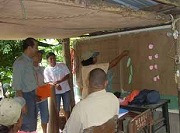
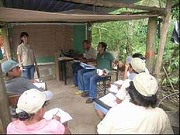
(Photo 1: left) Ms. Saito gives simple bookkeeping instructions.
(Photo 2: right) Role-playing. First you start by harvesting the crops. Here, a member harvests cucumbers.
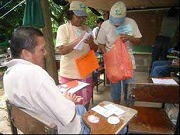
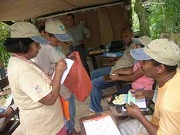
(Photo 3: left) "Who wants to buy our cucumbers?" Even though it's a game, everyone takes their role seriously.
(Photo 4: right) "Don't you need some more tomatoes?"
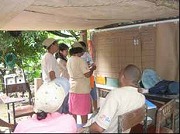
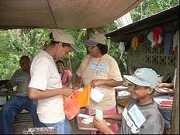
(Photo 5: left) Members even approach the banker to sell their produce; everyone laughs.
(Photo 6: right) After finishing the sales, members return home and make an entry into the cashbook. I wonder if they remember what they practiced earlier.
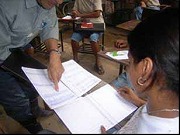
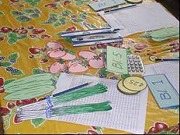
(Photo 7: left) Paper play money, coins, tomatoes, onions, cucumbers, etc.
(Photo 8: right) "It looks like you got it right!"
(Mr. Isao SAKAI, Chief Advisor / Rural Development)
